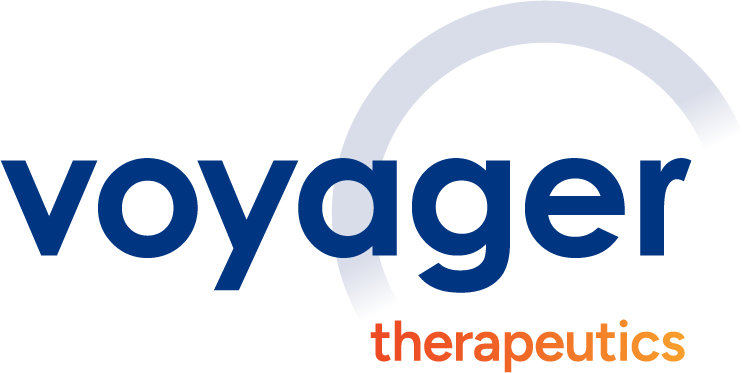Release Details
Voyager Therapeutics Highlights Programs in Parkinson’s Disease and ALS; Announces Expansion of CNS Pipeline at R&D Day
Top-Line Proof-of-Concept Clinical Data for Parkinson’s Disease Program (VY-AADC01) Remains on Track for the Fourth Quarter of 2016
IND Filing for ALS Program (VY-SOD101) Targeted for Late 2017
Two New Gene Therapy Programs Targeting Tau and Nav1.7 Announced
“We believe the potential of our robust AAV product engine is vast. In addition to enabling our ongoing programs, we are excited to unveil two new programs today that are focused on the molecular targets tau and Nav1.7, and have the potential to be important treatments for severe CNS disorders such as Alzheimer’s disease and severe, chronic pain, respectively,” said
Product Programs Highlighted:
VY-AADC01 for Advanced Parkinson’s Disease
VY-AADC01 is being evaluated for the treatment of advanced Parkinson's disease in an ongoing Phase 1b dose-ranging safety trial. Overall, the goal is to restore patients’ responsiveness to their levodopa medication and provide improved control of their motor symptoms, or “turn back the clock” on their Parkinson’s disease, by using AAV to deliver the gene encoding the enzyme aromatic L-amino acid decarboxylase (AADC; the enzyme that converts levodopa to dopamine) to a specific region of the brain known as the putamen. Voyager remains on track to report top-line human proof-of-concept data for VY-AADC01 in the fourth quarter of 2016. These results will include six-month follow up clinical efficacy and biomarker data from the first 10 patients (cohorts 1 and 2) enrolled in this trial. The company will also provide an interim update on this trial in mid-2016, which will include surgical coverage data of the putamen from the first 10 patients enrolled in this trial.
In addition to a presentation by Voyager management, the team will be joined by
VY-SOD101 for a Monogenic Form of ALS
VY-SOD101 is in preclinical development for the treatment of a monogenic form of ALS caused by mutations in the superoxide dismutase 1 (SOD1) gene. Based upon preclinical data, Voyager believes that suppressing SOD1, which causes disease through a toxic gain of function mutation, could have a clinically meaningful impact on the progression of disease. The company is targeting an IND filing for VY-SOD101 in late 2017.
In addition to a presentation by Voyager management, the team will be joined by
New Pipeline Programs:
The two new Voyager preclinical pipeline programs announced today, VY-TAU01 and VY-NAV01, are focused on the molecular targets tau and Nav1.7, respectively.
- VY-TAU01: Pathological and aggregated tau protein is believed to play a key role in the severe CNS disorders frontotemporal dementia and Alzheimer’s disease. Voyager is developing an AAV vectorized version of an anti-tau monoclonal antibody for direct delivery to the CNS. Based on preclinical data, Voyager believes that this approach could achieve significantly higher levels of the therapeutic anti-tau antibody in the CNS when compared to systemic administration of an antibody. In addition, such an approach could achieve a durable clinical benefit following a single administration of the therapy.
- VY-NAV01: Nav1.7 is a sodium ion channel that is required for pain transmission. Voyager believes that an AAV gene therapy approach targeting the knockdown of Nav1.7 in sensory neurons could be an effective treatment for certain forms of severe, chronic pain. In addition, such an approach could achieve a durable clinical benefit following a single administration of the therapy and avoid the addictive potential associated with many current drugs used to treat severe, chronic pain. VY-NAV01 leverages Voyager’s extensive experience designing novel microRNA knockdown cassettes and delivering them using AAV, an approach that the company is using for its ALS (VY-SOD101) and Huntington’s disease (VY-HTT01) programs.
Financial Guidance:
The two new product programs disclosed today were included in Voyager’s financial guidance provided in connection with its full year 2015 financial results reported on
Webcast Information
Beginning at
About
Forward-Looking Statements
This press release contains forward-looking statements for the purposes of the safe harbor provisions under The Private Securities Litigation Reform Act of 1995 and other federal securities law. The use of words such as “may,” “might,” “will,” “should,” “expect,” “plan,” “anticipate,” “believe,” “estimate,” “project,” “intend,” “future,” “potential,” or “continue,” and other similar expressions are intended to identify forward-looking statements. For example, all statements Voyager makes regarding the initiation, timing, progress and results of its preclinical programs and clinical trials and its research and development programs, its ability to advance its AAV-based gene therapies into, and successfully complete, clinical trials, its ability to continue to develop its product engine, its ability to add new programs to its pipeline, its expected cash, cash equivalents and marketable securities at the end of the fiscal year and anticipation for how long expected cash, cash equivalents and marketable securities will last, and the timing or likelihood of its regulatory filings and approvals, are forward looking. All forward-looking statements are based on estimates and assumptions by Voyager’s management that, although Voyager believes to be reasonable, are inherently uncertain. All forward-looking statements are subject to risks and uncertainties that may cause actual results to differ materially from those that Voyager expected. These statements are also subject to a number of material risks and uncertainties that are described in Voyager’s Annual Report on Form 10-K filed with the
Contact: Investor Relations:Sarah McCabe Stern Investor Relations, Inc. 212-362-1200 sarah@sternir.com Media:Katie Engleman Pure Communications, Inc. 910-509-3977 Katie@purecommunicationsinc.com

